
views
X
Research source
Confirming Citizenship by Descent

Identify a Polish citizen in your ancestry. Poland recognizes "right of blood" citizenship, which means if at least one of your parents is a Polish citizen when you were born, you are a Polish citizen. You can trace this back through generations. However, the initial Polish citizen on which your citizenship is based must have lived in Poland after 1920, when Poland became an independent country. For example, suppose your maternal grandfather was a Polish citizen who immigrated to the US in the 1930s. Because of his Polish citizenship, your mother would be considered a Polish citizen. Because your mother was a Polish citizen (even if she didn't claim her citizenship rights), you qualify for Polish citizenship by descent.
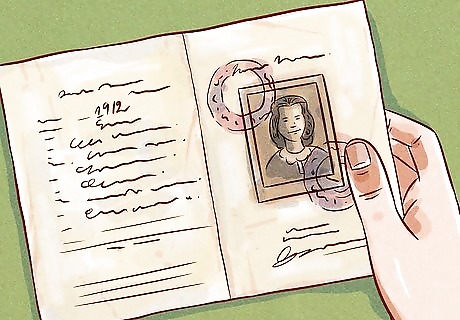
Find proof that your ancestor never renounced their Polish citizenship. The primary way your ancestor may have lost their Polish citizenship is that they may have renounced it to become a citizen of another country. However, not all countries require naturalized citizens to renounce their foreign citizenship. Determine if your ancestor was ever a citizen of any country other than Poland. Although they immigrated elsewhere, they may have been a permanent resident and never applied for citizenship. If your ancestor was a citizen of a country other than Poland, check that country's law to determine whether renunciation of foreign citizenship was required to become a naturalized citizen. Even if your ancestor wasn't required by law to renounce their Polish citizenship to become a citizen of the other country, they may have done it anyway. A Polish embassy or consulate may be able to help you find any record that they renounced their Polish citizenship.

Evaluate evidence regarding your ancestor's Polish citizenship. Even if your ancestor never renounced their Polish citizenship, they may have lost it in another way. After 1920, no Polish national could lose their citizenship without knowing it. You may have to comb through many old documents and letters to find information, however. For example, if your ancestor immigrated to Israel, they would not have automatically lost their Polish citizenship or been forced to renounce it. However, if they served in the Israeli military they might have lost their Polish citizenship. Until 1951, Polish citizens who served in a foreign military lost their Polish citizenship. Exceptions are made for anyone who fought in World War II.
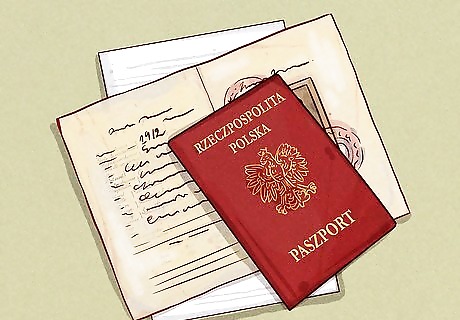
Gather all available documentation on your ancestor. If you're lucky, you may actually have a passport or other direct citizenship documentation. However, in most cases, your ancestor's citizenship must be figured out through inference from other available documents. For example, if your ancestor immigrated to the US, but never became a citizen of the US, you may be able to infer that they retained their Polish citizenship. Many documents and citizenship registers can be found in the National Archives of Poland. An agent in Poland can search these registers for you to find the name of your ancestor.

Hire a professional agent in Poland. Citizenship officials in Poland recommend that you hire an attorney or professional agent to represent your case for citizenship in Poland, especially if you live in another country. Interview several different agents and look into their backgrounds very carefully. If you choose someone who doesn't represent you adequately, your application may be delayed or even denied. You can search online for agencies in your home country that help Polish descendants confirm their Polish citizenship. You can also talk to people who successfully confirmed their Polish citizenship and get recommendations for agencies to use. Ask for a full list of fees in writing before you hire an agent to represent you.
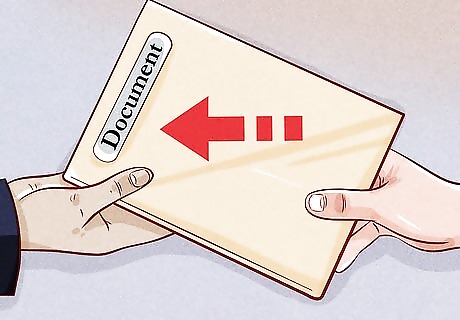
Submit your application and documentation to the Voivodeship Office. Your agent will assist you in filling out the application and gathering the appropriate documents to support your application. Your application and all documents submitted must be in Polish. If you live in another country, you must name a personal representative in Poland to receive correspondence from the Voivodeship Office. If you've already hired a professional agent, they can serve as your representative also.Did You Know? You don't have to speak Polish to claim citizenship by descent, nor do you even have to travel to Poland. Provided you can prove you are descended from a Polish citizen, you are automatically a Polish citizen.

Wait for a decision from the Voivode. Once the Voivodeship Office has received your application and documentation, staff will start reviewing your documents and comparing the evidence you've found to official government records. Some cases can take months, or even years, to fully process. Since you have the burden of proving your Polish citizenship, the Voivode may request additional documents or information before making a final decision. A voivode decision is considered "declaratory," meaning that there's no such thing as a final denial. If you find and submit additional documents or information to support your case, the decision may change.
Becoming a Permanent Resident

Stay in Poland without interruption for at least 5 years. Polish immigration law requires you to live and work in Poland continuously before you become eligible to apply for permanent residency. You are allowed to leave Poland, but not for more than 6 months in one year. In some situations, you can apply to become a permanent resident after fewer than 5 years. For example, if you married a Polish citizen, you only have to live in Poland for 3 years before applying to become a permanent resident.Tip: If you have to leave Poland for compulsory military service in your home country, or for an important personal reason, your stay will still be considered continuous as long as you were gone less than a year.
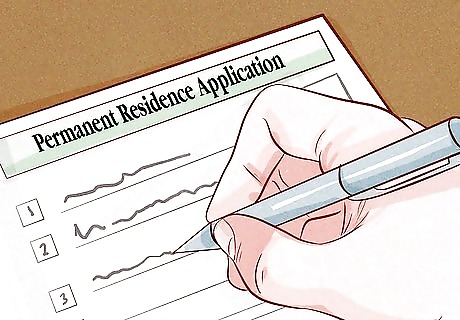
Complete the permanent residence application. The permanent residence application is in Polish and must be filled out in Polish. Generally, it requires you to provide information about yourself, your personal background, and your residence in Poland. You can download the permanent residence application at udsc.gov.pl/en/do-pobrania/wnioski/. Applications are also available at your local Voivodeship Office. There are 2 different applications, depending on whether you are an EU resident or a national of a country outside the EU. You don't have to demonstrate proficiency in Polish to become a permanent resident. If you don't understand Polish well enough to complete the application, have a native speaker help you or hire a professional agent to fill it out for you.
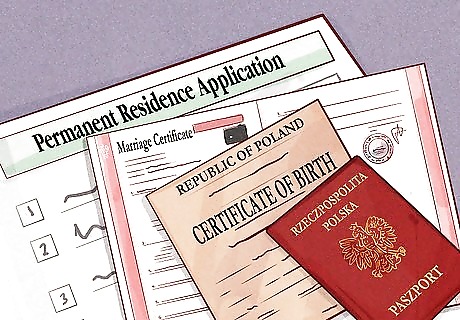
Gather supporting documents for your application. Generally, you need official documents to support any information you entered on the application. In addition to that, you need documentation verifying the reasons you are qualified to become a permanent resident. For example, if you are seeking permanent resident status because you married a Polish national, you would need your spouse's birth certificate or a copy of their passport to prove their citizenship, plus a copy of your marriage certificate. The marriage certificate copy cannot be more than 3 months old.
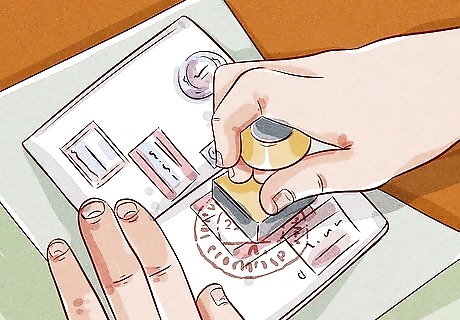
File your application in person at the Voivodeship Office. You must be present in the country to file an application for permanent residence. Once your application is filed, the Voivode stamps your foreign passport to indicate you've applied for permanent resident status in Poland. You cannot travel outside of Poland once your passport is stamped. You can return to your country of origin, but you won't be able to return to Poland without a residence card or a visa.
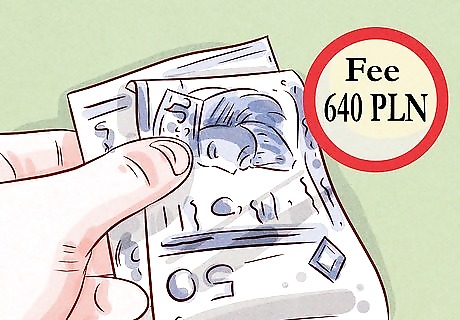
Pay the required fees to apply for permanent residence. The fee to process a permanent residence application is 640 PLN, as of 2019. Contact the Voivodeship Office to confirm the amount of fees you'll have to pay and what methods of payment are accepted. If your application is approved, you will have to pay an additional 50 PLN for your residence card. While you are at the Voivodeship Office, you will also be fingerprinted. The fingerprints will be included in your permanent resident card if you are granted permanent resident status.
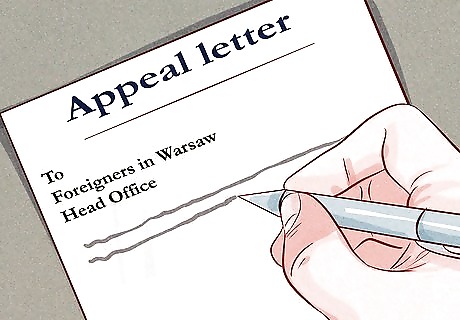
Receive a decision from the Voivodeship Office. Permanent residence applications are typically processed in 30 days or less. If the Office is unable to reach a decision on your application within 30 days, you will receive a notification explaining the reason for the delay. The notification will let you know when you can expect to receive a decision. If your application for permanent residence is denied, you can appeal the decision to the Head of the Office of Foreigners in Warsaw. You must file a written appeal within 14 days of the day you receive the decision from the Voivodeship Office. You may not be able to stay in Poland during the appeal.
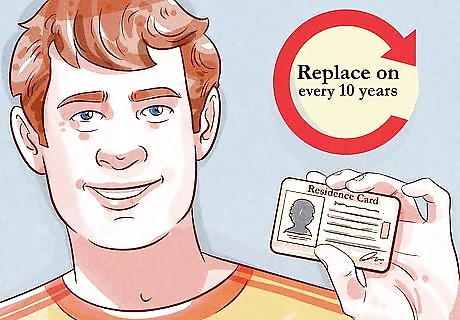
Replace your residence card every 10 years. Your permanent residence status is indefinite. However, the physical card itself must be replaced every 10 years. You don't have to reapply for permanent residence, just get the card replaced. File your application for your new card at least 30 days before the old one expires, to allow for processing time.
Applying for Citizenship by Naturalization

Live and work in Poland for at least 5 years as a permanent resident. Typically, you must be a permanent resident of Poland for 5 years before you are eligible to apply for citizenship. Since 5 years is required before you can become a permanent resident, most citizenship applicants have lived in Poland for at least 10 years. There are some situations in which you can become eligible for citizenship in fewer than 5 years. For example, if you are married to a Polish national, you can apply for citizenship after 2 years.

Take an exam to certify your Polish language skills. To be eligible for Polish citizenship, you must have a certificate issued by the State Commission for the Certification of Proficiency in Polish as a Foreign Language. The Commission offers an exam to test your Polish proficiency. You must achieve the basic communication level (level B1) on the exam to get a certificate. Information about the exam can be found at http://certyfikatpolski.pl/o-egzaminie/. This website is in Polish.

Fill out the citizenship application. The citizenship application requires information about your nationality, your education, your work, and your financial history. The application is in Polish and must be filled out in Polish. You can download a PDF copy of the application at https://nowyjork.msz.gov.pl/resource/49b69723-4ba8-4bf2-aeab-7671dde8ee96:JCR.
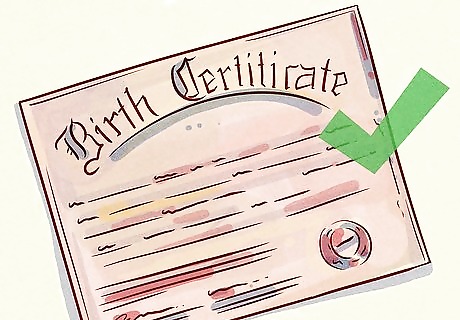
Gather documents to support your application. Factual statements you make in your citizenship application must be supported with official documents. Any foreign documents, such as a foreign birth certificate, must be translated into Polish. Submit both the original document and the translation with your application. Use a certified translator or a Polish consul to translate foreign documents. If you use a translator, the translation must also be certified by the Polish consul. Include 4 photographs of yourself, passport size, that are no more than 6 months old. Get certified copies of any official documents you submit. You will not get any of these documents back, so make sure you're not sending your only copy.

Submit your application documents through the appropriate authority. If you are living abroad or staying in Poland on a visa, you must submit your application through the Polish consul. If you are a permanent resident, submit your application through the province governor in the province where you live. You can take your application and supporting documents to the office in person, or you can mail them using traditional mail. If you mail your application, use registered mail so you'll know when it was received. If you mail your application, your signature must be witnessed and certified by a legal authority.

Pay the required fees. As of 2019, the fee for a decision on Polish citizenship is 219 PLN. If your application for citizenship is denied, you can have the fee refunded at your request. Contact the consul to find out the specific amount of fees owed, and what methods of payment are acceptable.
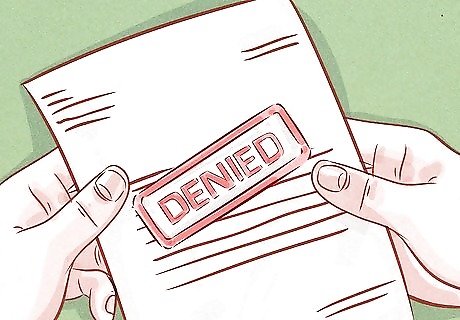
Receive notice of the decision on your application. The province governor's office provides you either with a deed granting citizenship, or a notice that your application has been denied. You cannot appeal a denial and won't be given the reasons for the denial. Citizenship is granted by the President of the Republic of Poland. However, the consul or province governor and the Minister of the Interior review your application before it reaches the President. Expect the process to take anywhere from several months to a year. The Minister of the Interior may request additional documents or information before forwarding your application to the President. The province governor's office will notify you of any requests for additional documents or information.Tip: At any point during the review process, the President can call up a citizenship application to review directly. The President also has the power to grant citizenship to anyone, regardless of how long they've lived in Poland.
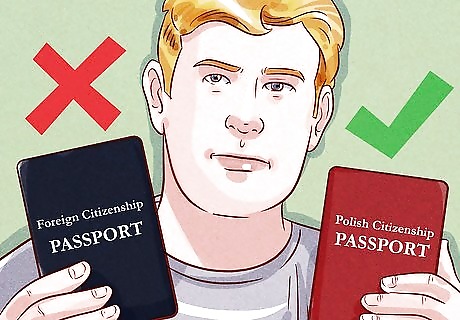
Renounce your foreign citizenship, if necessary. The laws of your home country determine whether or not you must renounce your citizenship to become a Polish citizen. If you do need to renounce your citizenship, you may do so at the embassy or consulate for your home country. Although Polish law does not recognize dual citizenship, Polish citizens are not forbidden from also being citizens of another country. However, Poland will only recognize you as a Polish citizen. This means you couldn't enter or leave Poland with a passport from another country.












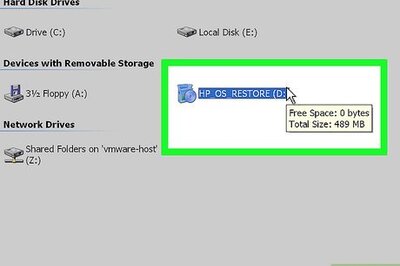





Comments
0 comment